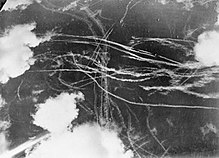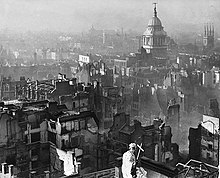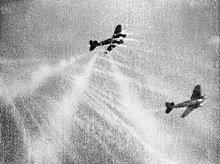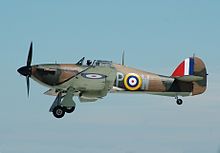Battle of britain
The Battle of Britain (in English, Battle of Britain; in German, Luftschlacht um England) is the name given to the set of air combats fought in the British sky and over the English Channel, between July and October 1940, when Nazi Germany sought to destroy the British Royal Air Force (RAF). in order to achieve the necessary air superiority to invade Great Britain, this operation known as Operation Sea Lion.
Neither Adolf Hitler nor the Wehrmacht believed it was possible to achieve a successful amphibious invasion until the RAF had been neutralized. Secondary objectives were to destroy aircraft production and ground infrastructure in order to force the British government to seek a negotiated solution. The Germans were defeated by the British, allowing the Allies to use Britain as a base to invade Europe in 1944.
Some historians have argued that if any type of invasion would have been possible given the massive superiority of the British Royal Navy over the Kriegsmarine, such an operation would likely have been a disaster. It is argued that the Luftwaffe would have been unable to prevent the decisive intervention of Royal Navy cruisers and destroyers, even with air superiority.
The Battle of Britain was the first major battle fought entirely in the air. It was the largest and most attended air campaign to date and the first test of the bombing strategies that emerged since World War I. It was also the first defeat for Germany in World War II. This defeat meant that, when Hitler invaded the USSR in 1941, Germany fought in a war with two open fronts at the same time, contradicting his ideas set forth in Mein Kampf, in which he exposed Germany's geographical disadvantage., positioned between the Western powers (such as the United Kingdom and France) and the socialist government of the USSR, with respect to other powers and therefore should never fight a war without first closing one front before opening another.
Background
After the evacuation of the Anglo-French army at Dunkirk (May 26, 1940) and the surrender of France (June 22, 1940), Germany had the European continent under control. The only power that resisted him was the United Kingdom.
Adolf Hitler projected total victory in the European theater assuming that, after the surrender of France, the United Kingdom would soon succumb. Confirmed the neutrality of the United States, the United Kingdom found itself isolated from the European continent and also German submarines attacked merchant ships from its colonies and the American continent. The Soviet Union, for its part, was unwilling to face German might.
This vision of triumph led to the Luftwaffe not attacking the United Kingdom during June 1940, pending its surrender. The German war machine was ready for the final assault on the islands, but Hitler wanted to end the war with magnanimous theatrics and without spilling a drop of blood, while also avoiding risks to the Kriegsmarine, which had already fought hard (and suffered several losses) between April and June 1940 in the invasion of Norway.
However, the British refused to surrender and used all the resources of the British Empire to continue the war with Germany, and from 1941 they added the resources of the United States to their cause. The United Kingdom still had the most powerful navy in the world (a condition that it would cede to the US after the end of the war in 1945) and this would greatly help to maintain the supply lines to the country from North America and from the United Kingdom itself. to the Soviet Union once the USSR entered the war a year later.
It is important to remember that from the capitulation of France in June 1940 until Hitler's invasion of the USSR in June 1941, the UK stood alone for a full year as the sole power fighting Nazi Germany with only some American support. The United States would not officially enter the war until December 1941.
The name of the battle comes from one of Winston Churchill's famous speeches, delivered in the House of Commons on June 18, 1940, coinciding with the 125th anniversary of the Battle of Waterloo:
What General Weygand called the Battle of France is over. I guess the Battle of England is about to start.What General Weygand has called the Battle of France is over. I expect that the Battle of Britain is about to begin.
Winston Churchill
Operation Sea Lion
Faced with the iron stance of Winston Churchill, the British Prime Minister, Hitler was forced to go ahead with hostilities, and began to design an invasion plan for the British Isles called Operation Sea Lion. Hermann Göring, commander of the Luftwaffe and second man of the Third Reich, was jubilant. Up to that moment, his aviation alone had reaped crushing victories without practically suffering significant casualties, [ citation needed ] and he promised Hitler to finish off British aviation in a few days. The strategy developed was based on a complete annihilation of the RAF that would allow the Wehrmacht a landing without mishap on the British coast. For this, Göring had three fleets: Luftflotte 5, based in Norway; Luftflotte 2, in the Netherlands and northern France; and Luftflotte 3, established west of the Seine. These three forces had about 3,600 aircraft, compared to just 871 RAF aircraft.
Hitler, confident in Göring's strategy, ordered his generals to prepare for the invasion at the beginning of July. As a prerequisite for success, the army and navy chiefs demanded that the Luftwaffe must attack steadily and relentlessly for three days straight to achieve complete air superiority in south-east England. Once this was achieved, Kurt Student's paratroop unit (the first in history and the only one in existence at that time) would fall on Dover to establish a gigantic bridgehead and the Kriegsmarine would begin the transfer of land forces by sea., counting that there would no longer be a British threat from the air.
At first it looked as if Göring's plan would come to fruition, as the German planes outnumbered the British and the German pilots, unlike the British, had considerable combat experience. From the beginning of July 1940, the Luftwaffe dedicated itself to attacking British naval convoys over the English Channel, testing the state of British defenses and giving German pilots more experience against an enemy of considerable strength. The targets of the German bombs in that first stage were not the civilian populations, but the coastal defenses of the United Kingdom over the English Channel, the industrial installations near the city of London, the military airfields and the network of radar stations. (Home Chain).
Operation Day of the Eagle
However, the British side had superiority in the air, not in numbers but in speed of action, thanks to the use of radar. Developed a few years earlier by the British physicist Robert Watson-Watt, and in combination with the visual observation posts stationed on the coast, radar was a significant tactical advantage for the British Royal Air Force, since it allowed enemy aircraft to be detected in order to coordinate and send the fighters at the right time and number to combat the German incursions.
Also, the mass production of the famous Supermarine Spitfire fighter brought winds of hope to the RAF. The Spitfire had greater maneuverability than the Bf109.
Faced with the German attacks, the British naval convoys canceled their navigation through the English Channel, while the British pilots rejected the duel in the air whenever possible, due to German numerical superiority, and knowing the It was difficult for them to maintain prolonged combats due to their fuel limitations. Given this, Göring, in mid-August 1940, decided to change tactics and fight not over the English Channel, but directly over British soil. The objectives varied and stopped concentrating on industries to focus on bombing airfields and coastal defenses that prevented the German invasion, as well as road networks. British planes were easier to destroy if hit before taking off. This German tactic had worked in Poland, where several planes owned by the Polish Air Force had been destroyed from the air by the Luftwaffe. However, the British used a camouflage system to prevent planes from being seen from the air, which sometimes worked and sometimes didn't, and they also went so far as to position planes so that a bomb could not completely destroy them before taking off at be protected, flanked with materials such as cement that protected the devices from the impacts of the bombs. Another very successful British tactic was to deceive the Germans into creating fake hangars for the Luftwaffe to bomb while the real hangars housing the planes had been camouflaged.
The beginning of this new operation, named by Göring "Eagle Day", began on August 15, 1940. The Luftwaffe had more than 1,000 bombers and some 700 fighters for the operation and it is estimated that they carried out 2,119 actions that day. After this first day of operations, forty German planes were shot down, but the consequences of the bombing were devastating for the RAF.
On the night of August 24-25, 1940, during an attempted bombing raid on the Thames oil terminals, the East End of London was mistakenly bombed despite Hitler's express prohibition. a few days after the twenty-fifth anniversary of the first bombing raid on London (on September 8, 1915, several zeppelins dropped their bombs on the city).
In response to German bombardment, the British attempted to attack Tempelhof airport and the Siemens factory the following night, though the bombs caused only light damage to residential neighborhoods and the outskirts of Berlin. They continued their attacks on other German cities, such as Leipzig and Hannover, and even Turin and Milan in Italy, but Churchill insisted that the main target must remain Berlin.
The date of the bombing of Berlin coincided with the interview of the Reich Foreign Minister, Joachim von Ribbentrop, in Berlin with his Soviet counterpart, Viacheslav Molotov, to demonstrate to the Soviet Union the imminent German triumph and to make new agreements with the Soviet government. The interview had to be interrupted so that the attendees could go down to a bomb shelter because Berlin was being bombed by the RAF. This made Molotov disbelieve Von Ribbentrop's words about Germany's near final victory over the United Kingdom. Ribbentrop had assured his guest that 'the British were on their last legs and would be defeated', but Molotov asked seriously 'If that is true then why are we in this bunker and who is dropping bombs outside?'
Tipping Point
Although the damage in the British bombing raid on Berlin was practically negligible (at least compared to the extensive damage caused by the Luftwaffe on British soil), Churchill got what he wanted. Hitler, wounded in his pride, ordered the Luftwaffe to abandon the strategy of bombing British airfields to concentrate on the cities; Mainly about London. It was then that the Blitz began, a sustained bombardment by German aviation of British cities, which took place between September 7, 1940 and May 16, 1941, and whose objective was to terrorize the civil population. Between September and November 1940, the city of London was bombed daily by German planes, day and night. There were also attacks on Birmingham and Bristol, and the Germans, in their eagerness for revenge, bombed cities renowned for their architecture and culture such as Exeter and Bath. Although this change of tactics in the air war meant the near destruction of London, Churchill was willing to make the sacrifice in exchange for the RAF having time to rearm. This objective was achieved and the British surpassed the Germans in aircraft production, although they did not have as many pilots, which was becoming a serious problem.
German casualties weren't particularly heavy for the Luftwaffe, while British casualties were heavy for the RAF (visibly outnumbered considering all the German planes stationed throughout occupied Europe), but the feeling it was that Germany was losing the battle by not achieving the objective claimed by the Kriegsmarine: the destruction of the British air force as a requirement to start Operation Sea Lion. The German Heinkel He 111 and Junkers Ju 88 bombers encountered increasing British resistance, unable to count on the protection of Messerschmitt Bf 109 fighters, which had low flight range to be able to fulfill their missions from German airfields in France, and British morale did not crack.
Finally, tired of waiting and impressed by the casualties (from July 10, 1940 to October of the same year 1,733 aircraft according to German figures and almost 1,900 according to British sources), Hitler decided on September 17, 1940 to cancel Operation Sea Lion and ordered a new type of air raid to begin: indiscriminate night bombing taking advantage of the darkness of night to avoid as much as possible the fight against British aviation and its rapidly improved anti-aircraft systems. Continuous air attacks between November 1940 and February 1941 then reached Coventry (with the almost total destruction of this small city), Birmingham, Liverpool, Plymouth, Manchester, Sheffield, Hull, and Bristol, with the Luftwaffe arriving to bomb Belfast, on the island of Ireland, on April 15, 1941. The city of London continued to be attacked by the Luftwaffe, less frequently but even more powerfully. In a way, that was the unspoken way of accepting the British victory and the first major defeat of the Luftwaffe.
An Italian expeditionary force of about forty planes called the Corpo Aéreo Italiano was sent by Benito Mussolini to assist in the battle alongside the Luftwaffe in September 1940; Italian planes took part in several engagements but suffered heavy losses and were unsuccessful until they were repatriated in January 1941. Similarly, the RAF began to receive pilots from most of the British Empire: there were pilots from Canada, the Union of South Africa, Australia and New Zealand. To this were added volunteers from countries already occupied by German troops, creating squadrons made up entirely of pilots from Poland, Czechoslovakia and Free France. In total, out of 2,936 RAF pilots and crew who took part in the Battle of Britain, there were 15 different nationalities, including 141 Poles, 87 Czechs, 24 Belgians and 13 French.
September 15, 1940, commemorated since then as "Battle of Britain Day", was the day with the highest concentration of Luftwaffe fighter attacks on London. In the morning, some 250 British fighters fought some 150 German fighters, while in the afternoon some 275 Hurricanes and Spitfires fought some 340 Messerschmitt 109s. One in five RAF pilots flying that day were Polish pilots. On that day the Luftwaffe lost more than 60 aircraft, while the British lost about 80. On the other hand, although the Messerschmitt 109s were faster than the Hurricanes and Spitfires —always depending on altitude— they were flying at the limit of their effective range capacity..
Two days later, Hitler ordered the definitive cessation of Operation Sea Lion.
At the end of May 1941, the large-scale Luftwaffe attacks on the United Kingdom ceased. The British Government was not only not going to capitulate to Hitler, but on the contrary the desire for resistance had increased with the sole objective of defeating Germany: the RAF maintained its strength and British aircraft production increased. Therefore, the Luftwaffe had not fulfilled the main mission that had been entrusted to it. Consequently, the Kriegsmarine considered that it was a very high risk to carry out Operation Sea Lion in such circumstances, since it was much inferior to the Royal Navy. Hitler, after attacking and defeating the Kingdom of Yugoslavia and the Kingdom of Greece in April 1941, ordered the deployment of the majority of German fighters and bombers in Eastern Europe so that the Luftwaffe would now support the army's attack against the Soviet Union from the 22nd of June, in Operation Barbarossa. The Germans had lost the battle, which would have major consequences, for four years later the British and Americans would use south-eastern Britain as a base for the Normandy landings in order to liberate western continental Europe.
Cinema
In 1969, director Guy Hamilton made the film of the same name.
Contenido relacionado
Bangladesh
August 4th
17











